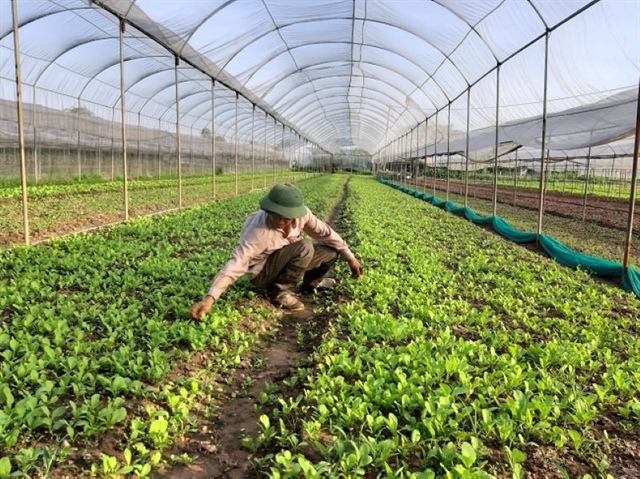Hanoi craft villagers benefit from OCOP program
Hanoi craft villagers benefit from OCOP program
Taking part in the One Commune One Product program, local businesses see their competitiveness increase.
The General Services Cooperative in Ba Vi District is applying VietGAP in tea production in 40 ha out of the commune's 471 ha plantation. After being rated by Hanoi’s One Commune One Product program (OCOP), the tea made by the cooperative in Hanoi’s suburban district of Ba Vi has gained more popularity.

A farm facility in Chuong My District. Photo: Anh Ngoc |
Dinh Cong Phu from the cooperative said its tea met the criteria of food hygiene and safety by the OCOP authorities after being sampled, analyzed, and assessed every year.
The cooperative and many other farmers in the locality participating in the OCOP program are committed to maintaining the quality of their products.
According to Vice Chairman of Ba Vi District People's Committee Do Quang Trung, the OCOP program has helped the district's agricultural products and production of craft villages be standardized with good quality and more eye-catching designs.
Thereby, the local products have cemented their position in the market, improving incomes of households and cooperatives, then contributing to the realization of the goal of building a new-style rural area of the district, he added.
Recently, Ba Vi District has classified 54 OCOP-labeled products of 14 individuals and businesses which were mainly farm produce and beverages such as fresh milk and derived products, honey, dried bud tea, pomelo, sticky rice, and furniture.
Tackling weaknesses
Thanh Xuan Clean Organic Agriculture Service Cooperative in Soc Son District has 20 products that have been given a star rating by the city People's Committee, making it the pioneer in developing OCOP products.
With OCOP certification, the cooperative's products have found a foothold in the market with demand well-exceeding supply.
However, the local OCOP businesses still have to tackle some existing shortcomings related to labels, packaging, and pre-processing of organic vegetables, according to the assessment of the city’s authorities. It is also suggested to expand the production area and link the chain to meet the demand for organic vegetables.
Like Thanh Xuan Cooperative, a production facility in Ta Thanh Oai Commune in Thanh Tri District with 11 OCOP-certified products (mainly herbal teas) also needs to improve the packaging and labeling of products after being assessed.
Le Dinh Tuan, the facility’s owner, said the establishment is recommended to diversify its market approach. “This is an important basis for us to make appropriate changes to enhance the value of the products,” he said.
Permanent Deputy Chief of the Hanoi Office for New Rural Areas Construction Program Coordination Nguyen Van Chi said the city's interdisciplinary supervision team frequently checks and assesses the manufacturers of OCOP products to ensure that they comply with regulations on the use of stamps, labels, and packaging as well as environmental protection and food safety.
Chi emphasized: “This activity helps to increase the competitiveness of OCOP products in the market.”
Hanoi targets to complete the evaluation and classification for at least 2,000 OCOP products by 2025. In the coming time, the city will continue to push for greater efficiency in the implementation of the program, according to the Director of the municipal Department of Agricultural and Rural Development Chu Phu My.
So far, the city’s OCOP program has attracted the participation of 74 companies, 82 cooperatives, and 99 business households, which are contributing to creating jobs for more than 5,000 workers in rural areas.
























